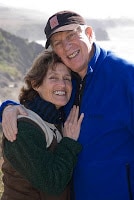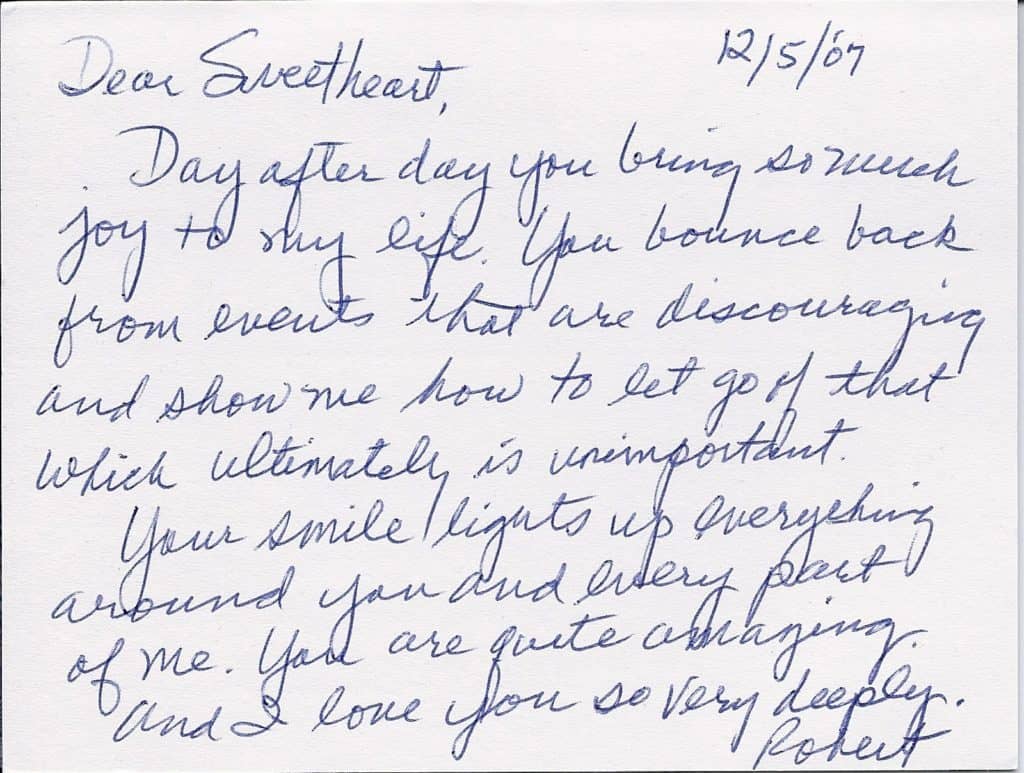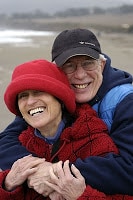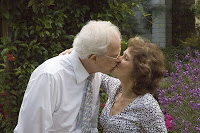Posts Tagged ‘Joan’s love story’
“You honor me when you do your work” — Robert to Joan
As much as I enjoy and believe in my work, it’s often hard to concentrate on writing my book with Robert gone. After more than a year and half, I still can’t breathe in and out without missing him mightily. He is always in my thoughts and in my heart.
Almost right up to the end of his life, Robert actively supported my dream of this book. “You’ve got to keep doing your work,” he told me earnestly, knowing he would not live to read it. During the last weeks that we were able to walk in the park together, we discussed this book—what would be in it, how it would expand on topics brought up in Better Than I Ever Expected, what new topics it would need.
I would read him excerpts from emails and interviews that were coming in, and he would listen compassionately. Sometimes he would sit down in my study and start talking, and I would scramble to type what he said.
Although my beloved Robert died before this book could be written, it will be as much his as mine. “You honor me when you do your work,” I hear his voice telling me.
Finding Love in Later Life
When Carol Denker interviewed me for her magnificent Autumn Romance, she started with this prelimary questionnaire. I came across it today and wanted to share it with you, as Valentine’s Day approaches:
CD: What advice would you give to individuals over 50 who are looking for love?
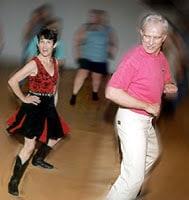 JP: Participate in social activities that you love, and you’ll meet people with similar passions. In my case, I loved line dancing — in fact, I taught line dancing.
JP: Participate in social activities that you love, and you’ll meet people with similar passions. In my case, I loved line dancing — in fact, I taught line dancing. That was how I met Robert Rice, the love of my life, a man who happened to be looking for a new place to dance in December 2000.
CD: What have you learned about love from this relationship?
Missing Robert
I’m trying to work on my book, but as my birthday approaches, I miss Robert so horribly that I had to write memories of him. Excerpts:
I cried with Robert when we were forced to accept his death. His mind stayed strong at first as his body weakened. While he still had the strength, he prepared with the care and organization that he always ran his life. He got his affairs in order and cleaned out his files and his painting studio. He gave away thousands of dollars worth of art supplies to an art program for developmentally disabled adults. He made gifts to family and friends. He labeled files that I would need.
Multiple myeloma sapped his life from him while he still breathed. His back, broken in six places, caused him brutal pain. One day he drew the pain to show me. His drawing was so raw, so anguished, so horrible in its detail, that I wail aloud picturing it. I am tempted to share it with you here, but I won’t, because you could never forget it.
It wasn’t until Robert entered hospice care that he was able to be at peace, out of pain, and a loving man again. I owe a great debt of gratitude to hospice, who figured out how to medicate him properly and counseled him with great respect and warmth. They also gave me the bereavement support and counseling that enabled me to preserve what was left of my sanity.
Robert’s last ten days were spent in bed, journeying in and out of consciousness. Sometimes he woke startlingly lucid and sweet, sharing memories and words of love. Often he was only semi-awake, seeming to have one foot in our world and one foot in another. His comments were occasionally hilariously funny – he saw our line dance class dancing with llamas on a stage in front of us, for example, or he plucked flying books from the air for his granddaughter Megan, an avid reader, to attach to her eyes — though he didn’t know why we were laughing.
Sometimes he slept for days, and I thought I’d never hear his voice again.
One day I was crying in my study, listening to his breathing on the baby monitor that hospice recommended. “I wish I had my best friend, my darling Robert, to ask for help with this,” I sobbed.
Then it occurred to me: I still did. Perhaps the man in the bed was a shadow of the man he used to be, but he was still there. I went to the bedroom, where he lay, eyes closed, mouth slack. I took his limp hand and whispered, “Can you please help me for a minute?”
“Yes,” he said quietly, without opening his eyes.
“How will I go on without you?” I asked, resting my tear-streamed face on his chest as lightly as I could so I wouldn’t hurt him.
He stroked my hair slowly, a whisper of a touch, soft as a kiss. “You’ll be okay,” he told me. “Reach out to people.”
Now I do. I reach out to people I know, people I don’t know. I reach out to you.
First anniversary of Robert’s death
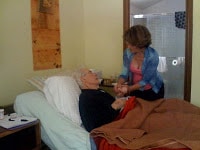 “Will you be able to say goodbye when it’s time?” I asked Robert softly, holding his limp hand in both of mine.
“Will you be able to say goodbye when it’s time?” I asked Robert softly, holding his limp hand in both of mine.
I couldn’t tell if he was thinking about his answer, or drifting in and out of consciousness, or even if he had heard me.
“No,” he said finally, without opening his eyes.
It was a few days before Robert died last August 2, and we both knew he was close to the end. Hospice — such wonderful people! — kept him painfree as his bones deteriorated and his body processes shut down. He drifted between asleep (or unconscious) and half-awake, sometimes painting in the air with his fingers, sometimes thinking it was time to go to dance class or out to lunch (though he hadn’t been out of bed or eaten for a week), occasionally jumping into clarity for a few precious moments.
As Robert’s cancer progressed, I felt trapped in a nightmare that I couldn’t escape or rescue my beloved Robert, who was slipping away from me day by day, hour by hour.
Now, though, I am grateful that I was able to share this profound transition with him. I learned a lot about death that I never knew, never imagined. I also learned how love wins somehow, even at the end. Robert was rarely conscious over the last few days, but when he was, he murmured love to me.
Thank you, readers, for sharing with me the exhilaration and sensuality of our great love affair and far-too-short marriage. It feels right to share this part with you, too. 
